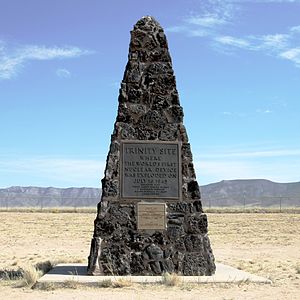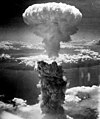Portal:Nuclear technology
The Nuclear Technology Portal
Introduction

- Nuclear technology is technology that involves the nuclear reactions of atomic nuclei. Among the notable nuclear technologies are nuclear reactors, nuclear medicine and nuclear weapons. It is also used, among other things, in smoke detectors and gun sights. (Full article...)
- Nuclear power is the use of nuclear reactions to produce electricity. Nuclear power can be obtained from nuclear fission, nuclear decay and nuclear fusion reactions. Presently, the vast majority of electricity from nuclear power is produced by nuclear fission of uranium and plutonium in nuclear power plants. Nuclear decay processes are used in niche applications such as radioisotope thermoelectric generators in some space probes such as Voyager 2. Reactors producing controlled fusion power have been operated since 1958 but have yet to generate net power and are not expected to be commercially available in the near future. (Full article...)
- A nuclear weapon is an explosive device that derives its destructive force from nuclear reactions, either fission (fission or atomic bomb) or a combination of fission and fusion reactions (thermonuclear bomb), producing a nuclear explosion. Both bomb types release large quantities of energy from relatively small amounts of matter. (Full article...)
General images -
Selected article -
The United States and Denmark launched an intensive clean-up and recovery operation, but the secondary stage of one of the nuclear weapons could not be accounted for after the operation was completed. USAF Strategic Air Command "Chrome Dome" operations were discontinued immediately after the accident, which highlighted the safety and political risks of the missions. Safety procedures were reviewed, and more stable explosives were developed for use in nuclear weapons.
In 1995, a political scandal arose in Denmark after a report revealed the government had given tacit permission for nuclear weapons to be located in Greenland, in contravention of Denmark's 1957 nuclear-free zone policy. Workers involved in the clean-up program campaigned for compensation for radiation-related illnesses they experienced in the years after the accident. (Full article...)Selected picture -

The black plaque on top reads:
Trinity Site
Where The World's First Nuclear Device Was Exploded On July 16, 1945
Erected 1965 White Sands Missile Range J. Frederick Thorlin Major General U.S. Army Commanding
The gold plaque below it declares the site a National Historic Landmark, and reads:
Trinity Site has been designated a National Historical Landmark
This Site Possesses National Significance In Commemorating The History of the United States of America
1975 National Park Service United States Department of the Interior
Did you know?
- ... that after a 2008 tornado, Michael Chertoff likened Picher, Oklahoma, to a nuclear bomb site?
- ... that poet Peggy Pond Church became a strong pacifist and a member of the Society of Friends after the Manhattan Project used her home as a place to build nuclear weapons?
- ... that Project Ketch proposed the detonation of a 24-kiloton nuclear device in Pennsylvania to create a natural-gas storage reservoir?
- ... that campaigning by climate activist Kimiko Hirata halted plans to build 17 new coal-fired power plants following the Fukushima nuclear disaster in Japan?
- ... that the medieval Castle Knob was the site of a Cold War nuclear monitoring station?
- ... that T. K. Jones thought that a nuclear war was survivable if "there are enough shovels to go around"?
Related WikiProjects
Things you can do
| Parts of this portal (those related to section) need to be updated. Please help update this portal to reflect recent events or newly available information. Relevant discussion may be found on the talk page. (September 2021) |
Selected biography -
A graduate of the University of California, from which she obtained a degree in political science, Priscilla Greene started working for Lawrence in February 1942, and then for Oppenheimer later that year. She arrived in Santa Fe, New Mexico, in March 1943, and established the Los Alamos Laboratory's office. She became the office manager at Los Alamos, greeting visitors, answering the telephone, making travel arrangements, arranging security passes and accommodation, and taking notes of telephone calls. In September 1943, she married Robert B. Duffield, a chemist working at the Los Alamos laboratory, and changed her surname from Greene to Duffield.
In the post-war years, Duffield was secretary and executive assistant to Roger Revelle, the director of the Scripps Institution of Oceanography. In November 1967, she became secretary and executive assistant to Robert R. Wilson, the founding director of the National Accelerator Laboratory, and once again she helped establish a new scientific laboratory on a new site. In later life she moved to Colorado, where she served on the board of the Uncompahgre Medical Clinic. (Full article...)
Nuclear technology news
- 14 February 2025 – Russian invasion of Ukraine
- Chernobyl Nuclear Power Plant drone strike
Related portals
Related topics
Subcategories
Associated Wikimedia
The following Wikimedia Foundation sister projects provide more on this subject:
-
Commons
Free media repository -
Wikibooks
Free textbooks and manuals -
Wikidata
Free knowledge base -
Wikinews
Free-content news -
Wikiquote
Collection of quotations -
Wikisource
Free-content library -
Wikiversity
Free learning tools -
Wiktionary
Dictionary and thesaurus






































































































